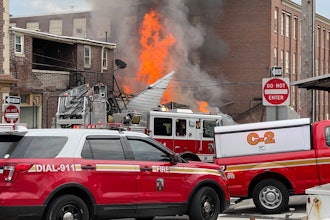WASHINGTON (AP) -- The official responsible for nuclear safety in the United States said Tuesday he is worried that U.S. nuclear plant operators have become complacent just nine months after the nuclear disaster in Japan.
Gregory Jaczko, chairman of the Nuclear Regulatory Commission, said recent instances of human error and other problems have endangered workers and threatened safety at a handful of the 65 nuclear power plants in the United States.
Workers at nuclear plants in Ohio and Nebraska were exposed to higher than expected radiation levels, Jaczko said, while three other plants were shut down for months because of safety problems, the first time in more than decade that several plants have been shut down at the same time.
The Crystal River nuclear plant in Florida and Fort Calhoun in Nebraska remain shut down, while the earthquake-damaged North Anna plant in Virginia reopened last month after being shut down for three months.
Jaczko said he was not ready to declare a decline in safety performance at U.S. plants but said problems were serious enough to indicate a "precursor" to a performance decline.
"We need to make sure that (nuclear) licensees continue to do the right thing for safety. That's the number one thing going forward," Jaczko said at a meeting with reporters at NRC headquarters. "There are some things we want to keep an eye on to make sure we are not seeing really true declines in performance."
Jaczko said incidents at Cooper Nuclear Station in Nebraska and Perry Nuclear Power Plant in Ohio "almost led to workers getting very, very significant doses" of radiation. Jaczko blamed the incidents on human error and improper work plans. The incidents show the need to focus on more than plant construction and technical solutions that provide increased protection against earthquakes, floods and fires, Jaczko said.
"The softer side of the safety business can have a real impact," he said, referring to plant operations and worker performance.
In response to the disaster at Japan's Fukushima Dai-ichi plant, the NRC approved a number of actions to improve safety at the nation's 104 nuclear reactors. The changes are intended to make the plants better prepared to handle incidents they were not initially designed to face, such as prolonged power blackouts or damage to multiple reactors at the same time.
"This has been a year driven by events in Japan," Jaczko said.
Even so, the year was remarkable for natural disasters at home.
The North Anna plant in Virginia shut down when an Aug. 23 earthquake caused peak ground movement about twice the level for which the plant was designed. Significant earthquakes are quite unusual in the eastern state of Virginia.
Other U.S. reactors were threatened by severe flooding in the Midwest and tornado damage in the Southeast.
The NRC has conducted a greater number of special inspections this year, 20 so far, than at any point in recent memory, Jaczko said. The inspections were all prompted by site-specific concerns but could indicate broader problems, he said.
Tony Pietrangelo, senior vice president of the Nuclear Energy Institute, an industry group, called the past year "challenging," but said the industry is in broad agreement with the NRC's response to the Japan crisis. Specifically, he said the industry is ready to adopt most of the commission's short-term changes, including one to improve response to prolonged power outages, most likely through additional equipment such as portable pumps, battery chargers, hoses and even bulldozers.
"We are committed to addressing lessons learned from Fukushima through expeditious actions in concert with our regulator, but not at the expense of our focus on day-to-day safe and reliable plant operations," Pietrangelo said.






















